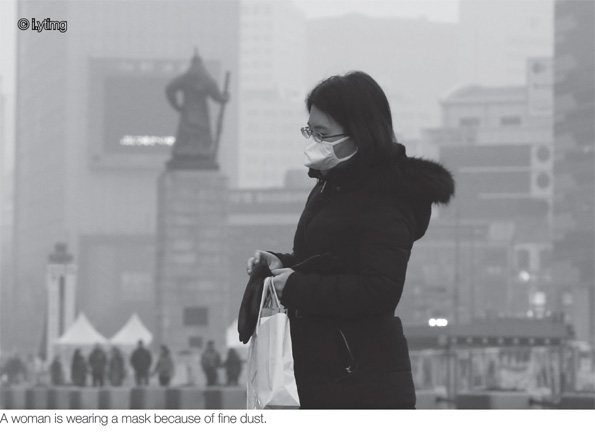
Recently, the increasing amount of fine dust has caused many problems. Kwon Min-ju (’17, School of Business Administration) said, “I already have rhinitis, and it is getting worse because of fine dust.” Kim Eun-ji (’17, School of Business Administration) also said, “Although I wear glasses, the dust gets into my eyes and makes my eyes hurt, and although I drink a lot of water, my mouth does not feel fresh at all.” Likewise, the problems of fine dust can happen to anyone.
Fine dust is the dust that consists of tiny particles among floating dust, and it is divided into two types: PM10 and PM2.5. PM 10’s diameter is less than 10μm, and PM2.5’s diameter is less than 2.5μm. The former includes emissions from boilers, cars, developing facilities and dust from construction sites and roads. Since PM10 also comes from the combustion of fossil fuels, PM10 is a dust that originates from our daily activities. The latter mostly consists of secondary pollutants, which are caused by reactions between dust and particles in the air. These are called ultrafine particles. PM2.5 particles normally consist of sulfates, nitrates, and organic carbons, and they occupy almost 58.3% of all dust. According to the Ministry of Environment, 30~50% of air pollutants are from foreign countries.
It has been shown that factories in China have been a major source of South Korea’s fine dust. For example, on May 14th, 2017, a forum about a project named ‘One Belt and One Road’ was held in Beijing. The project was about linking Central Asia and Europe by building a silk road on land and linking South-East Asia, Europe and Africa with a new shipping lane by sea, but the funny thing was that while the forum was being held, the Chinese government decided to close some factories located in the vicinity of the forum. As a surprising result, the concentration of fine dust drastically decreased in South Korea.
Fine dust (PM10, PM2.5) exerts bad influences on many parts of our country. Fine dust affects the environment. Fine dust with much sulfur dioxide (SO2) or nitrogen dioxide (NO2) makes acid rain, which causes acid soil and acid water that destroy the ecosystem. Fine dust also sticks to leaves of plants and delays plants’ growth because it hinders plants’ photosynthesis. Secondly, fine dust also affects industrial activities. Semiconductor industries and display technology are especially sensitive to fine dust. The result of that is the increasing fraction of defective products. Adding to this, fine dust can reduce visibility, and it can cause damage to the tourism industry, such as airlines and other vessels.
As the two students mentioned, fine dust causes much discomfort in people’s daily lives. Most dust is filtered by nostril hairs or tracheobronchial mucosa, and it is naturally excreted from the nose, but fine dust is too small to be filtered, so it permeates into our body directly. The immunocytes of our body, which take charge of immunity among the cells, act to remove the dust and protect our bodies. Then, the inflammatory response causes a side effect. When the inflammatory response occurs in organs, it can cause asthma, respiratory disease or cardiovascular risk, and when dust piles up in the bronchial tubes, it makes us suffer from phlegm, frequent coughing, and dry mucous membranes. Those conditions help bacteria penetrate our bodies more easily. According to the Korea Centers for Disease Control and Prevention, these kinds of symptoms can last for 6 weeks, degrade lung function and result in death in the worst cases. In addition, the rate of ischemic heart diseases (IHD), like myocardial infarction, can increase by up to 30~80%. For weak people, such as old men, pregnant women, children or people who have heart disease or circulatory disorders, they should take extra care .
How should we deal with fine dust? Lee Sung-wu, who is in charge of the policy bureau for the Cheongju Chungbuk Federation for Environment, said, “First, when the level of fine dust is high, you should follow the rules that the government suggests. For example, when you enter a house, you should beat the dust away from your body. If you don’t, the dust sticks to your clothes. The most important thing is that you should wear a mask. Masks which are not officially certified don’t function well, and some masks can be dangerous for people who have a respiratory disease. Therefore, if you have such diseases, you should consult a doctor.” He also said about the ways to reduce fine dust. “Everyone uses fossil fuels in daily life, so you should change your lifestyle to reduce fine dust. For instance, you can take the bus instead of a car or use devices only when you need to use them.” He recommended people should start with small things around them to reduce the overall dust problem.
By Jo Se-in
si38@cbnu.ac.kr


 All
All Society & Global
Society & Global






 Jo Se-in
Jo Se-in











